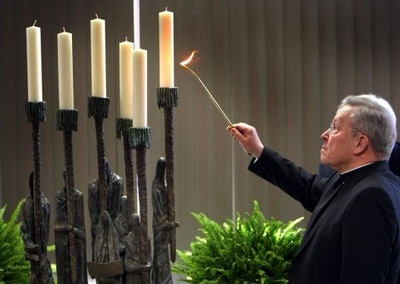“What marvels the Lord worked for them! What marvels the Lord worked for us: Indeed we were glad” (Ps 126)
“How good and how pleasant it is when brothers live in
unity” (Ps 133)
1. At the beginning of this encounter in the Great Synagogue
of the Jews of Rome, the Psalms which we have heard suggest to us the right
spiritual attitude in which to experience this particular and happy moment of
grace: the praise of the Lord, who has worked marvels for us and has gathered
us in his Hèsed, his merciful love, and thanksgiving to him for granting us
this opportunity to come together to strengthen the bonds which unite us and to
continue to travel together along the path of reconciliation and fraternity. I
wish to express
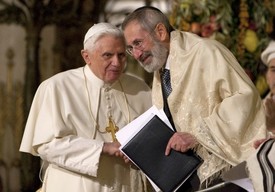
first of all my sincere gratitude to you, Chief Rabbi, Doctor
Riccardo Di Segni, for your invitation and for the thoughtful words which you
have addressed to me. I wish to thank also the President of the Union of
Italian Jewish Communities, Mr Renzo Gattegna, and the President of the Jewish
Community of Rome, Mr Riccardo Pacifici, for their courteous greetings. My
thoughts go to the Authorities and to all present, and they extend in a special
way, to the entire Jewish Community of Rome and to all who have worked to bring
about this moment of encounter and friendship which we now share.
When he came among you for the first time, as a Christian
and as Pope, my Venerable Predecessor John Paul II, almost 24 years ago, wanted
to make a decisive contribution to strengthening the good relations between our
two communities, so as to overcome every misconception and prejudice. My visit
forms a part of the journey already begun, to confirm and deepen it. With
sentiments of heartfelt appreciation, I come among you to express to you the
esteem and the affection which the Bishop and the Church of Rome, as well as
the entire Catholic Church, have towards this Community and all Jewish
communities around the world.
2. The teaching of the Second Vatican Council has
represented for Catholics a clear landmark to which constant reference is made
in our attitude and our relations with the Jewish people, marking a new and
significant stage. The Council gave a strong impetus to our irrevocable
commitment to pursue the path of dialogue, fraternity and friendship, a journey
which has been deepened and developed in the last forty years, through
important steps and significant gestures. Among them, I should mention once
again the historic visit by my Venerable Predecessor to this Synagogue on 13
April 1986, the numerous meetings he had with Jewish representatives, both here
in Rome and during his Apostolic Visits throughout the world, the Jubilee
Pilgrimage which he made to the Holy Land in the year 2000, the various
documents of the Holy See which, following the Second Vatican Council’s
Declaration Nostra Aetate, have made helpful contributions to the increasingly
close relations between Catholics and Jews. I too, in the course of my
Pontificate, have wanted to demonstrate my closeness to and my affection for
the people of the Covenant. I cherish in my heart each moment of the pilgrimage
that I had the joy of making to the Holy Land in May of last year, along with
the memories of numerous meetings with Jewish Communities and Organizations, in
particular my visits to the Synagogues of Cologne and New York.
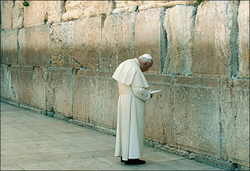
Furthermore, the Church has not failed to deplore the
failings of her sons and daughters, begging forgiveness for all that could in
any way have contributed to the scourge of anti-Semitism and anti-Judaism (cf.
Commission for Religious Relations with the Jews, We Remember: A Reflection on
the Shoah, 16 March 1998). May these wounds be healed forever! The heartfelt
prayer which Pope John Paul II offered at the Western Wall on 26 March 2000
comes back to my mind, and it calls forth a profound echo in our hearts:
“God of our Fathers, you chose Abraham and his descendants to bring your
Name to the nations: we are deeply saddened by the behaviour of those who in
the course of history have caused these children of yours to suffer, and asking
your forgiveness we wish to commit ourselves to genuine brotherhood with the
people of the Covenant.”
3. The passage of time allows us to recognize in the
Twentieth Century a truly tragic period for humanity: ferocious wars that sowed
destruction, death and suffering like never before; frightening ideologies,
rooted in the idolatry of man, of race, and of the State, which led to brother
killing brother. The singular and deeply disturbing drama of the Shoah
represents, as it were, the most extreme point on the path of hatred that
begins when man forgets his Creator and places himself at the centre of the
universe. As I noted during my visit of 28 May 2006 to the Auschwitz
Concentration camp, which is still profoundly impressed upon my memory,
“the rulers of the Third Reich wanted to crush the entire Jewish
people”, and, essentially, “by wiping out this people, they intended
to kill the God who called Abraham, who spoke on Sinai and laid down principles
to serve as a guide for mankind, principles that remain eternally valid”
(Discourse at Auschwitz-Birkenau Concentration Camp: The Teachings of Pope
Benedict XVI, II, 1 [2006], p.727).
Here in this place, how could we not remember the Roman Jews
who were snatched from their homes, before these very walls, and who with
tremendous brutality were killed at Auschwitz? How could one ever forget their
faces, their names, their tears, the desperation faced by these men, women and
children? The extermination of the people of the Covenant of Moses, at first
announced, then systematically programmed and put into practice in Europe under
the Nazi regime, on that day tragically reached as far as Rome. Unfortunately,
many remained indifferent, but many, including Italian Catholics, sustained by
their faith and by Christian teaching, reacted with courage, often at risk of
their lives, opening their arms to assist the Jewish fugitives who were being
hunted down, and earning perennial gratitude. The Apostolic See itself provided
assistance, often in a hidden and discreet way.
The memory of these events compels us to strengthen the
bonds that unite us so that our mutual understanding, respect and acceptance
may always increase.
4. Our closeness and spiritual fraternity find in the Holy
Bible – in Hebrew Sifre Qodesh or “Book of Holiness” – their most
stable and lasting foundation, which constantly reminds us of our common roots,
our history and the rich spiritual patrimony that we share. It is in pondering
her own mystery that the Church, the People of God of the New Covenant,
discovers her own profound bond with the Jews, who were chosen by the Lord
before all others to receive his word (cf. Catechism of the Catholic Church,
839). “The Jewish faith, unlike other non-Christian religions, is already
a response to God’s revelation in the Old Covenant. To the Jews ‘belong the
sonship, the glory, the covenants, the giving of the law, the worship, and the promises;
to them belong the patriarchs and of their race, according to the flesh is the
Christ’ (Rom 9:4-5), ‘for the gifts and the call of God are irrevocable!’ (Rom
11:29)” (Ibid).
5. Many lessons may be learnt from our common heritage
derived from the Law and the Prophets. I would like to recall some of them:
first of all, the solidarity which binds the Church to the Jewish people
“at the level of their spiritual identity“, which offers Christians
the opportunity to promote “a renewed respect for the Jewish interpretation
of the Old Testament” (cf. Pontifical Biblical Commission, The Jewish
people and their Sacred Scriptures in the Christian Bible, 2001, pp.12 and 55);
the centrality of the Decalogue as a common ethical message of permanent value
for Israel, for the Church, for non-believers and for all of humanity; the task
of preparing or ushering in the Kingdom of the Most High in the “care for
creation” entrusted by God to man for him to cultivate and to care for
responsibly (cf. Gen 2:15).
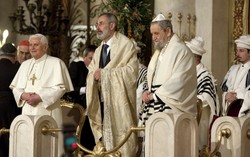
6. In particular, the Decalogue – the “Ten Words”
or Ten Commandments (cf. Ex 20:1-17; Dt 5:1-21) – which comes from the Torah of
Moses, is a shining light for ethical principles, hope and dialogue, a guiding
star of faith and morals for the people of God, and it also enlightens and
guides the path of Christians. It constitutes a beacon and a norm of life in
justice and love, a “great ethical code” for all humanity. The
“Ten Commandments” shed light on good and evil, on truth and
falsehood, on justice and injustice, and they match the criteria of every human
person’s right conscience. Jesus himself recalled this frequently, underlining
the need for active commitment in living the way of the Commandments: “If
you wish to enter into life, observe the Commandments” (Mt 19:17). From
this perspective, there are several possible areas of cooperation and witness.
I would like to recall three that are especially important for our time.
The “Ten Commandments” require that we recognize
the one Lord, against the temptation to construct other idols, to make golden
calves. In our world there are many who do not know God or who consider him
superfluous, without relevance for their lives; hence, other new gods have been
fabricated to whom man bows down. Reawakening in our society openness to the
transcendent dimension, witnessing to the one God, is a precious service which
Jews and Christians can offer together.
The “Ten Commandments” call us to respect life and
to protect it against every injustice and abuse, recognizing the worth of each
human person, created in the image and likeness of God. How often, in every
part of the world, near and far, the dignity, the freedom and the rights of
human beings are trampled upon! Bearing witness together to the supreme value
of life against all selfishness, is an important contribution to a new world
where justice and peace reign, a world marked by that “shalom” which
the lawgivers, the prophets and the sages of Israel longed to see.
The “Ten Commandments” call us to preserve and to
promote the sanctity of the family, in which the personal and reciprocal,
faithful and definitive “Yes” of man and woman makes room for the
future, for the authentic humanity of each, and makes them open, at the same
time, to the gift of new life. To witness that the family continues to be the
essential cell of society and the basic environment in which human virtues are
learned and practised is a precious service offered in the construction of a
world with a more human face.
7. As Moses taught in the Shema (cf. Dt 6:5; Lev 19:34) –
and as Jesus reaffirms in the Gospel (cf. Mk 12:19-31), all of the Commandments
are summed up in the love of God and loving-kindness towards one’s neighbour.
This Rule urges Jews and Christians to exercise, in our time, a special
generosity towards the poor, towards women and children, strangers, the sick,
the weak and the needy. In the Jewish tradition there is a wonderful saying of
the Fathers of Israel: “Simon the Just often said: The world is founded on
three things: the Torah, worship, and acts of mercy” (Avoth 1:2). In
exercising justice and mercy, Jews and Christians are called to announce and to
bear witness to the coming Kingdom of the Most High, for which we pray and work
in hope each day.
8. On this path we can walk together, aware of the
differences that exist between us, but also aware of the fact that when we
succeed in uniting our hearts and our hands in response to the Lord’s call, his
light comes closer and shines on all the peoples of the world. The progress
made in the last forty years by the International Committee for Catholic-Jewish
Relations and, in more recent years, by the Mixed Commission of the Chief
Rabbinate of Israel and of the Holy See, are a sign of our common will to
continue an open and sincere dialogue. Tomorrow here in Rome, in fact, the
Mixed Commission will hold its ninth meeting, on “Catholic and Jewish
Teaching on Creation and the Environment”; we wish them a profitable
dialogue on such a timely and important theme.
9. Christians and Jews share to a great extent a common
spiritual patrimony, they pray to the same Lord, they have the same roots, and
yet they often remain unknown to each other. It is our duty, in response to
God’s call, to strive to keep open the space for dialogue, for reciprocal
respect, for growth in friendship, for a common witness in the face of the
challenges of our time, which invite us to cooperate for the good of humanity
in this world created by God, the Omnipotent and Merciful.
10. Finally, I offer a particular reflection on this, our
city of Rome, where, for nearly two millennia, as Pope John Paul II said, the
Catholic Community with its Bishop and the Jewish Community with its Chief
Rabbi have lived side by side. May this proximity be animated by a growing
fraternal love, expressed also in closer cooperation, so that we may offer a
valid contribution to solving the problems and difficulties that we still face.
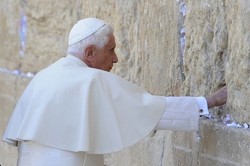
I beg from the Lord the precious gift of peace in the world,
above all in the Holy Land. During my pilgrimage there last May, at the Western
Wall in Jerusalem, I prayed to Him who can do all things, asking: “Send
your peace upon this Holy Land, upon the Middle East, upon the entire human
family; stir the hearts of those who call upon your name, to walk humbly in the
path of justice and compassion” (Prayer at the Western Wall of Jerusalem,
12 May 2009).
I give thanks and praise to God once again for this
encounter, asking him to strengthen our fraternal bonds and to deepen our
mutual understanding.
“O praise the Lord, all you nations, acclaim him, all you peoples. Strong is his love for us, He is faithful forever. Alleluia” (Ps 117)
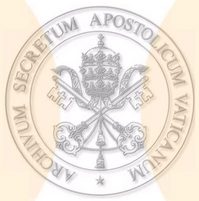 The release of these documents are the result of a request of the Pave the Way Foundation (PTWF) made to the Holy See to digitalize and publish 5,125 documents of the Vatican Secret Archives dated from March 1939 to May 1945. PTWF president Gary Krupp said his Foundation aims to remove the barriers between Catholic and Judaism. He told Jesús Colina of Zenit, “In the futherance of our mission we have recognized the papacy of the war time Pope Pius XII as a source of friction impacting over one billion people.”
The release of these documents are the result of a request of the Pave the Way Foundation (PTWF) made to the Holy See to digitalize and publish 5,125 documents of the Vatican Secret Archives dated from March 1939 to May 1945. PTWF president Gary Krupp said his Foundation aims to remove the barriers between Catholic and Judaism. He told Jesús Colina of Zenit, “In the futherance of our mission we have recognized the papacy of the war time Pope Pius XII as a source of friction impacting over one billion people.”



